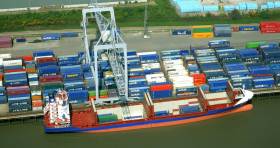Displaying items by tag: Containers Up Q2
DFDS Group Raises Outlook after Strong Q2
#DFDSgroup - European shipping and logistics operator, DFDS Group, writes LloydsLoadingList.com has raised its outlook for 2016 after a strong performance in the second quarter in which its freight volumes were up 33%. The increase is thanks to its much-expanded English Channel ferry capacity and 9% growth in other parts of its network.
The expanded ferry capacity in the Channel business unit supported 63% higher freight volumes and 23% more passengers, while freight volumes were up by 9% in all other parts of the network. “The Logistics Division achieved strong earnings growth through higher volumes and efficiency in both trailer operations and contract logistics,” the Copenhagen-headquartered group said.
Revenue for the three months to 30 June increased by 7%, year on year, excluding revenue from bunker surcharges, while reported revenue increased by 4% to DKK 3.6 billion (US$548 million). EBITDA operating profits before special items increased by 27% to DKK 699m following higher earnings in both the Shipping and Logistics divisions.
As for the UK & Ireland, DFDS Logistics (container services including out of Belfast, Dublin, Cork and Port of Waterford) business, the number of transported units in Q2 increased by 43.2% compared to 2015 mainly driven by new contract logistics activities for cold stores in England.Since the commencement of the contract for one cold store in Q4 2015, a further two cold stores were added during Q1 2016.
Volumes were reduced by optimisation of traffic between N. Ireland and England and the Continent as well as lower temperature controlled and steel volumes in the UK. EBIT decreased by 9% to DKK 15m mainly due to the impact of lower temperature controlled and steel volumes as well as the loss of a logistics contract for a food manufacturer in 2015. The result was, moreover, negatively impacted by the depreciation of the British pound.
For much more about the DFDS Group's performance across the Benelux, North Sea and Baltic regions, click here.





























































